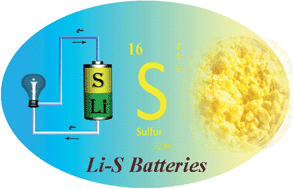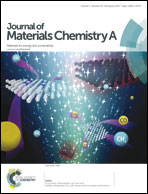High performance lithium–sulfur batteries: advances and challenges
Abstract
The development of high-energy batteries is highly attractive for powering advanced communication equipment and electric vehicles in future. Lithium–sulfur batteries have attracted much attention in recent years due to their low cost, high theoretical specific capacity and energy density. However, lithium–sulfur batteries have not been commercialized because of their intrinsic shortcomings, including the insulation of the active cathode materials, the high solubility of lithium polysulfides in organic liquid electrolytes, and the lithium dendrite in the anode. In this feature article, recent research progress in cathode materials, electrolytes, anode materials, and others is reviewed and commented upon. Some perspectives and directions on future development of lithium–sulfur batteries are pointed out based on knowledge from previous studies and our experience.


 Please wait while we load your content...
Please wait while we load your content...